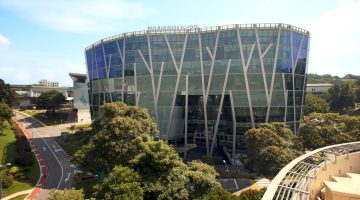10 common mistakes applicants often make
Thinking of applying for the NUS MBA programme? Here are some tips to help you ace your application by avoiding common mistakes which candidates often make!
#1 Not updating your resume
Candidates often upload their last professional resume without taking another look at it. However, you should take time to update your resume with your most recent professional achievements and any activities or interests you would like to be represented. Always make sure that your resume is current, accurate and succinct – unless you have more than 10 years of work experience, your resume should be kept to one page. Do also include your interests, hobbies and endeavours outside of work, we would like to know more about you as a person too!
#2 Rushing through the application form
One mistake that most candidates make is to dive straight into filling up the application form without reading the instructions on the first page. We also do not advise you to complete it in one sitting – you are allowed to save your entry and pick it up anytime later on. Do familiarise yourself with the instructions and application portal, and have all the required supporting documents ready. Give yourself ample time before the submission deadlines and you will also want to ensure that you review your entire applications before clicking on the “submit” button, to prevent any typos of shortage of documents.
Another common mistake is selecting the wrong specialisation programme. You do not have to select a specialisation at the point of application, unless you wish to pursue the Healthcare Management or Real Estate specialisation. Do also read up on curriculum offering for the specialisation programme you are interested in, to assess if it’s the right fit for you.
#3 Going off-topic for essays
Some applicants tend to go off-topic for the essay they are submitting. Always remember to stay on-point to the question, be succinct and focus on highlighting your career growth and how the NUS MBA programme can help you achieve your goals. Here’s a pro tip: You can ask a friend or peer to help proofread your essay and this will not only help you catch any errors, but also ensure that you stay on point!
#4 Not including referee reports as part of the application
Most of the time, candidates would mistakenly leave out initiating the referee reports from the application process on the portal, as they assumed that the submission of the reports would be initiated after clicking on the “submit” button. Instead, you should nominate your recommenders and have them submit the report before your online application submission. In fact, it would be best for the Admissions Office to receive a complete application which includes the referees report by the deadline. Do inform your referees before nominating them and notify them about the 2-week validity deadline, then follow up with them closely.
Here’s an additional tip: You should ideally nominate a referee who can receive external emails in their organisation/work mailbox, as the referee report must come from their work ID. Otherwise, it may prolong the admissions process if your referee has to submit the report manually.
#5 Issues with academic transcripts
As part of the application process, applicants are allowed to upload scanned copies of their transcripts and degree scrolls; they need not arrange for their official transcripts to be sent in directly from their school at this stage. Do note that non-English transcripts will have to be officially translated as well.
#6 Leaving out details of Standardised Tests (GMAT, GRE, EA, TOEFL, IELTS)
Candidates should have their test results ready before submitting their application. We do require candidates to input their test scores to help our Admissions Team assess your readiness for undertaking an MBA. We accept test scores from online tests, and if you do not have your official copies on hand, we will accept your unofficial scores or test taker copy as well. The score sheet must be uploaded as part of your application, even if you have sent your official scores to NUS. Another important detail to note: Your test scores should not expire less than one month from your application submission.
#7 Submitting the wrong financial supporting documents
Some applicants may feel that they need to demonstrate their ability to fund their MBA education, or qualify for a scholarship, by submitting their bank statement. This is not a requirement for admissions evaluation. Our scholarships are awarded on a merit basis, not a needs basis, so unless otherwise specified, proof of financial status is not required. Instead, we require a copy of your latest salary slip only. If your company is sponsoring your MBA studies, do upload your company sponsorship letter too.
#8 Missing out on scholarship application as part of the application process
Candidates often overlook the scholarship application as part of the whole application process. You can apply for a scholarship within the same application form. If you wish to apply for either a full or partial scholarship, you will have to answer an additional scholarship essay question to be considered.
Do note that scholarships are reviewed at regular intervals, so you may not be notified of your scholarship results at the same time as your application outcome. Some candidates may miss being selected for awards in earlier rounds of reviews, but there may be a chance for them to be considered later on. All successful scholarship recipients will be notified latest by mid-May (or mid-June for part-time MBA candidates). Do expect a longer waiting time for full and non-NUS scholarships such as the Dean’s Award, ADB Japan and APEC Scholarships.
#9 Not prepared for admissions interview
The admissions interview is an extremely important aspect of the application process. Do be well-dressed and well-presented; and pick a quiet environment with good lighting and internet connection for the virtual interview. The interview session will last about 30 minutes, so you will want to make a positive first impression and understand the interviewers’ question correctly so that you can provide an appropriate answer.
#10 Not preparing your finances in advance
One mistake which some candidates make is not preparing their finances in advance. The admissions to the NUS MBA programme is competitive and we may not be able to extend your acceptance deadline for the enrolment fee. Do note that not all candidates will be awarded a scholarship and hence, it is best to budget for your enrolment fee, including the balance of your tuition and living expenses, without factoring in scholarships.
If you’ve made it through the admissions interview…
Successful candidates will be notified via email regarding their application, and will be given one or up to two weeks to accept the offer together with the enrolment fee. At this stage, we will also require you to request your university to send us your official transcripts and degree scrolls, either via hard copy or an e-transcript service.
If you are an international full-time candidate, we will reach out to you in April or May to kick-start your campus housing and student visa application. The orientation for the Aug 2022 intake, for both full-time and part-time students, will start on 25 July 2022.


